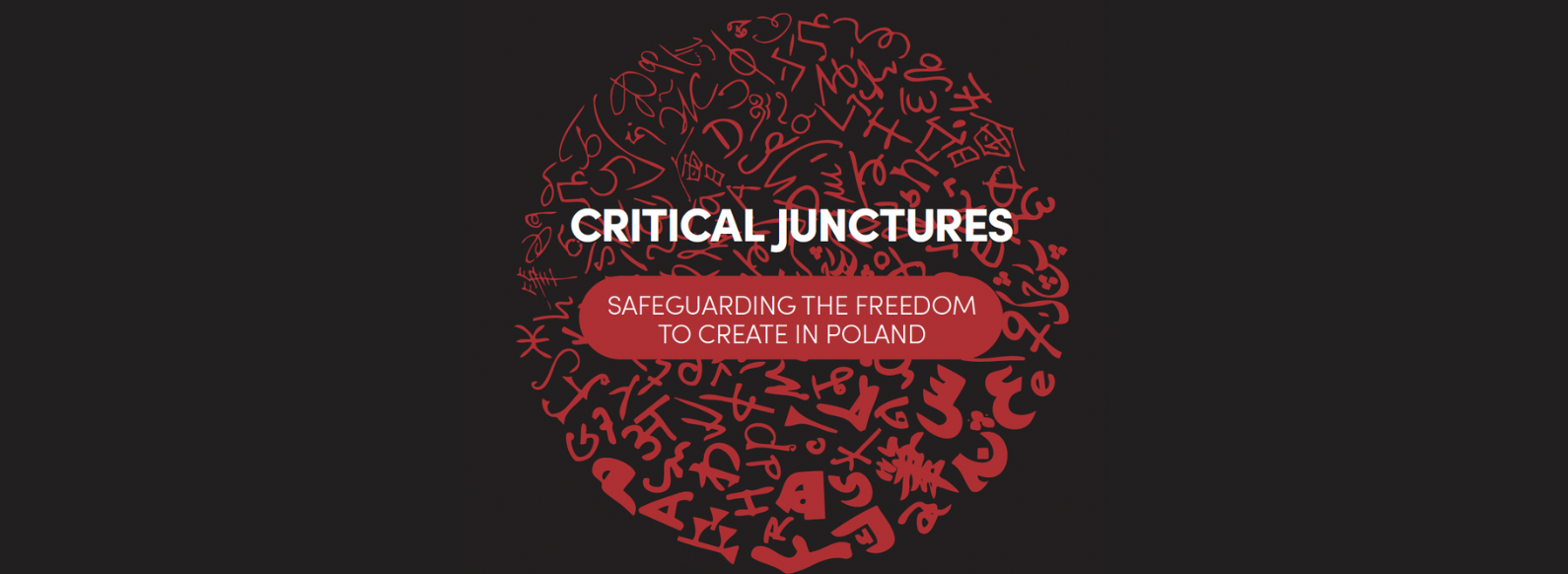
“Critical Junctures is a vital record of the pressures facing Poland’s writers, journalists, and cultural actors over the past decade while identifying catalysts for change. It shows not only how freedoms have been curtailed, but also the courage and resilience of those defending independent voices. We need its findings to guide real reform and safeguard expression for the future.” Burhan Sonmez, PEN International President.
28 October 2025: Today PEN International publishes its new report, Critical Junctures: Safeguarding the Freedom to Create in Poland, documenting the challenges to freedom of expression and cultural rights in the country between 2015 and 2025 while recognising the resilience of writers, journalists and civil society under mounting political pressure, and offering clear recommendations for reform.
Key findings
Between 2015 and 2023, under The Law and Justice Party (PiS), Poland saw a sharp decline in democratic safeguards. Judicial independence was weakened, public media were turned into government propaganda tools, and dissenting voices were incrementally silenced. Freedom of expression, though constitutionally guaranteed, came under constant pressure. Writers, journalists, and artists faced harassment, including SLAPP lawsuits, online abuse, and smear campaigns. Particularly harsh repression was aimed at marginalised groups.
Violations targeting literary expression were acutely visible. Writers who resisted government narratives were denied funding, censored, or subjected to hate campaigns. The literary community became polarised: conservative publishers and outlets promoted patriotic-Catholic themes, while progressive writers addressing women’s rights, LGBTIQ issues, or migration found themselves sidelined from state support. As Polish PEN member and author Adam Szostkiewicz observed: “The literary community is very diverse, yet the kind of dialogue that used to bridge different sensibilities has almost entirely disappeared.” Cultural funding and public institutions were used to deepen societal divides, contributing to self-censorship, particularly in environments dependent on state resources or vulnerable to reprisals.
Public service media were another major battleground. Fully captured under PiS rule, they became vehicles of disinformation and smear campaigns targeting government critics, refugees, and LGBTIQ communities. Parallel attempts to “repolonise” private media ownership – including the takeover of Polska Press by state-owned PKN Orlen in 2020 – further eroded pluralism. While reforms after 2023 ended state-led hate campaigns, public media remain politicised and in urgent need of structural change. International rankings reflect this contested trajectory: Poland fell in the World Press Freedom Index from 18th in 2015 to 66th in 2023, rising to 31st in 2025 – signalling fragile hope for improvement.
The election of a pro-democratic coalition in 2023 raised expectations for reform. Yet many repressive laws and structures remain, including criminal defamation provisions for insulting the President, and offending religious feelings. Protections against SLAPPs are still inadequate, and online harassment of writers – particularly women, queer, and minority voices – continues. The election in June 2025 of President Karol Nawrocki, who holds views that differ from the current government majority, introduces further uncertainty, as presidential vetoes could obstruct essential reforms.
Despite this hostile climate, dissent has never disappeared. Writers, journalists, and cultural actors continue to create debate and criticise. Civil society organisations remain active in defending pluralism and the right to free expression. This leaves Poland at a critical juncture, where the protection of artistic freedom must be accompanied not only by legal reform but by a cultural transformation that fosters inclusivity, equity, and pluralism.
Recommendations
Critical Junctures: Safeguarding the Freedom to Create in Poland is based on interviews with writers, journalists, cultural actors, and civil society organisations across Poland, as well as analysis of media coverage, legal frameworks, and public funding decisions over the past decade. It offers clear recommendations to both Polish authorities and international institutions. Among the most urgent are:
-
introducing safeguards against abusive litigation and decriminalising defamation;
-
reforming public media to guarantee independence and pluralism;
-
ensuring transparent and fair governance of cultural institutions;
-
establishing long-term, non-political support for writers;
-
protecting journalists and authors from harassment and intimidation; and
-
creating inclusive cultural policies that give voice to underrepresented communities.
International bodies, including the European Union and the Council of Europe, also have a role to play in monitoring Poland’s progress, supporting independent and marginalised cultural actors, and ensuring that artistic freedom is recognised as a key indicator of democratic health.
At this critical juncture, the resilience of Poland’s writers, artists, and civil society must be matched by concrete reforms. The survival of pluralism, independence, and diversity within Poland’s cultural life depends on strong legal safeguards, accountable institutions, and an unequivocal commitment to human rights.
PEN International calls upon the Polish authorities to seize this unique opportunity to restore trust and to protect the freedom to create – not as a matter of political choice, but as an obligation under international law and as the foundation of a society truly based on fundamental freedoms.
